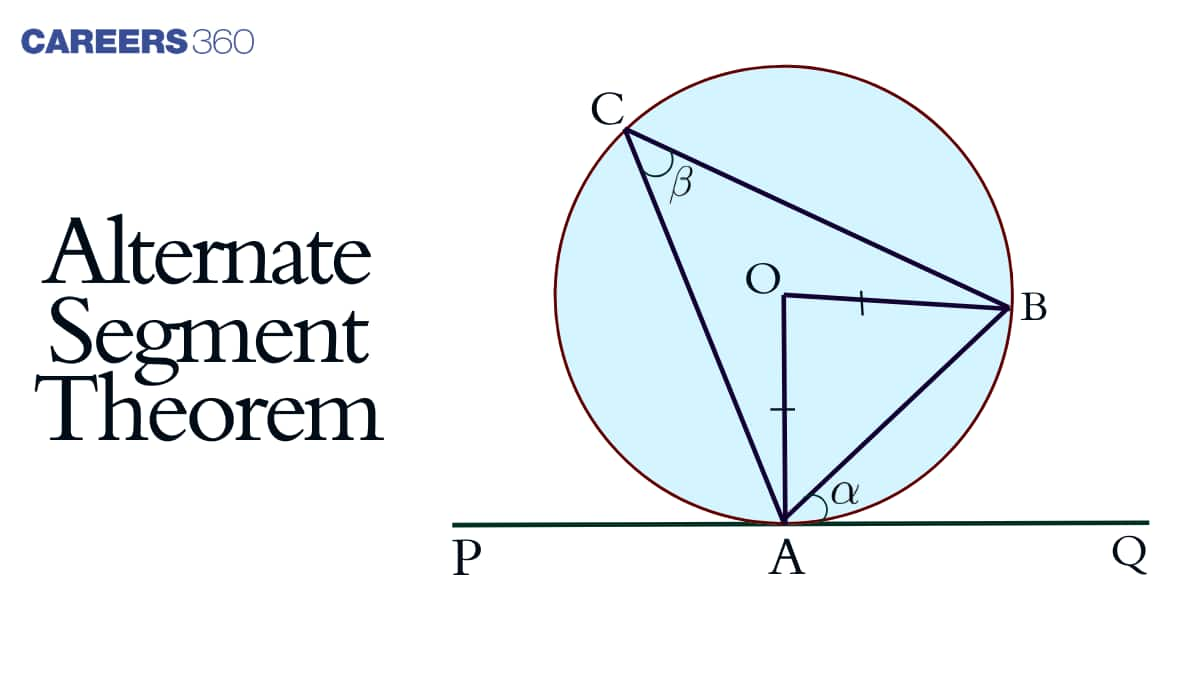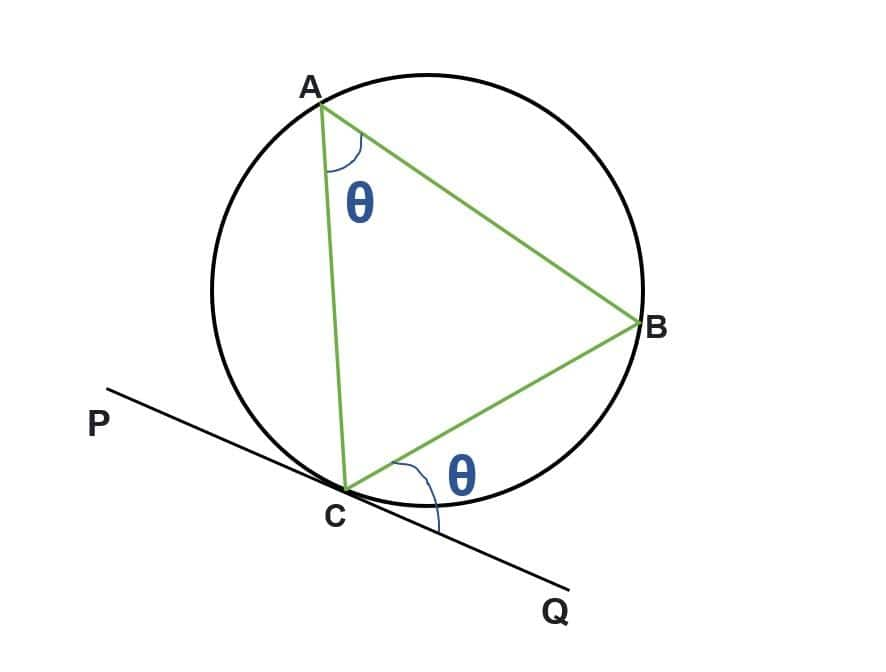Alternate Segment Theorem
“The angle that lies between the tangent and the chord is always equal to the angle subtended by the same chord in the alternate segment”
Mathematics may serve as a universal language since it is the same everywhere. No matter what language it is accompanied by, a phrase or formula has the same meaning. It consists of many important formulas, theorems, proofs, etc., one of which is the alternate segment theorem, this theorem is related to the circle.
- The Segment Of A Circle
- The Chord Of A Circle
- Theorems Related To Circles
- Alternate Segment Theorem
- Application Of Alternate Segment Theorem

In mathematics, the circle is a two-dimensional closed shape with all points on its surface having equal distances from its center and the region of a circle between a chord and its corresponding arc is called a segment. A major segment and a minor segment can be formed in the circle when a chord is drawn to it. The alternate segment theorem is one of the important circle theorems, which states that "the angle that lies between the tangent and the chord is always equal to the angle subtended by the same chord in the alternate segment."
The Segment Of A Circle
The segment of a circle can be defined as the portion or area between the chord of the circle and the corresponding arc of the circle. When a chord is drawn, two segments are formed, i.e., the minor segment and the major segment.
Major Segment: Major Segment can be defined as the area of the circle that is enclosed between a chord and its corresponding major arc.
Minor Segment: Minor Segment can be defined as the area of the circle that is enclosed between a chord and its corresponding minor arc.
The Chord Of A Circle
The line segment joining any two points on a circle’s circumference, then that line segment can be called as the chord of the circle. The diameter is the longest chord of any circle, which always passes through its center.
The Tangent Of A Circle
A line that touches the circumference of the circle only once and never enters inside that circle can be called the "tangent to the circle."
Let us understand this by taking an example: Imagine a bike moving on a road. The bike's wheel is shaped like a circle, and one point of the wheel is always in contact with the road. So here, the road can be considered the tangent of the wheel of the bike.
In the given figure, the red line represents the tangent to the circle.
Theorems Related To Circles
Circle theorems are characteristics that reveal connections between angles in a circle's geometry. These theorems allow us to calculate missing angles without a protractor by combining them with knowledge of other angle attributes. This has a lot of applications in engineering and design.
Alternate Segment Theorem
The alternate segment theorem states that “for every circle, the angle that lies between the tangent and the chord is always equal to an angle subtended by the same chord in the alternate segment."
This theorem is also known as the tangent-chord theorem because this property of the circle is related to the tangent of the circle and chord of the circle.
In the given figure, PQ is tangent to the circle and Chord CB subtends the ∠CAB which is equal to the ∠BCQ.
Application Of Alternate Segment Theorem
It can be used to solve problems related to the circles.
It can be used when there is a chord of the circle, a tangent is passing through one of the endpoints of the chord, and the angles that are used in the question are the angle between the chord and the tangent and the angle subtended by the chord in the alternate segment.
It can help to reduce a lot of large calculations and helps to reach an easy solution for the question.
Frequently Asked Questions (FAQs)
The region between the chord and the corresponding arc of the circle is known as the circle segment. Two segments, a minor segment, and a major segment are created when a chord is drawn.
The alternate segment theorem states that “For every circle, the angle subtended by the chord in the alternate segment is always equal to the angle subtended by the tangent of the circle across the point of contact of the tangent." This theorem is also known as the tangent-chord theorem.
A chord will form two segments when it is drawn in a circle: a major segment and a minor segment. The alternate segment is part of the segment created by that specific chord and that particular arc that is on the other side of the other segment.
The problem relating to the circle and its angle can be easily solved using an alternate segment theorem, which reduces the number of calculations required. The student won't need to apply as many other theorems because, in the absence of the alternate segment theorem, it would be necessary to apply a number of other theorems and properties, such as the cyclic quadrilateral theorem and the angle sum property of triangles, just to determine the values of intermediate angles. There would also be a number of additional calculations required to arrive at the final result.
Because this theorem is related to the angle subtended by the tangent of the circle and chord of the circle, i.e alternate segment theorem says that, For every circle, the angle subtended by the chord in the alternate segment is always equal to the angle subtended by the tangent across the point of contact of the tangent.
Also Read
02 Jul'25 05:16 PM
